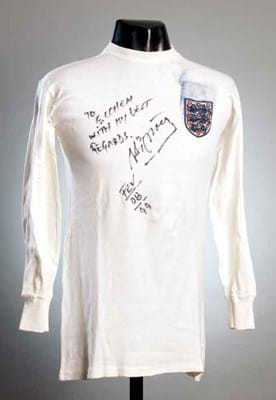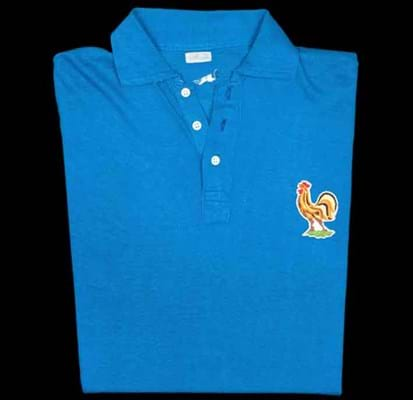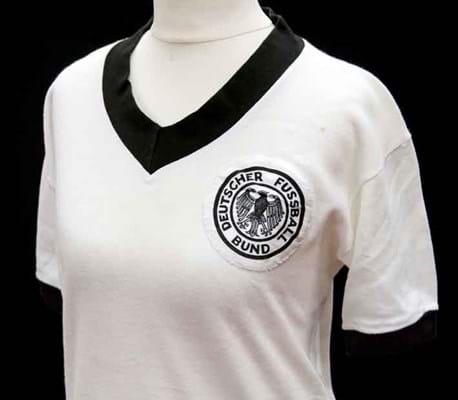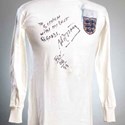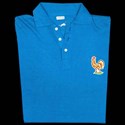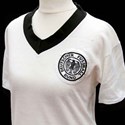A reminder of England's 1966 glory came up as part of a collection relating to World Cup-winning full-back George Cohen, consigned by the man himself to Graham Budd's (17.5% buyer's premium) latest sporting memorabilia sale.
The 27 lots included his white No.2 jersey worn in the semi-final against Portugal at Wembley on July 26, 1966. Cohen had swapped it with his opponent Antonio Simoes but the Portugese winger later returned it to him at a charity event in 1999 having signed and inscribed the jersey: 'To G. Cohen, with my best regards, Fev 08 99'.
Born in Kensington in 1939, Cohen - who spent his entire club career at Fulham - was in competition with Jimmy Armfield for the full-back position for the 1966 World Cup but had become Alf Ramsey's first choice by the time the tournament started. Cohen played in every game of the winning campaign. His nephew Ben Cohen later achieved a remarkable family double by winning the Rugby World Cup in 2003.
The semi-final shirt eventually sold for a low-estimate £3000. This was some way behind the £32,000 seen for Cohen's red World Cup Final jersey that sold at Christie's South Kensington in June 2006 and also the reported £80,000 paid by Fulham for his 1966 winners' medal in 1998.
The Cohen collection offered at Graham Budd on May 22-23 was just one of the stand-out items among the many football-related lots being offered in a series of special auctions inevitably being timed to coincide with the current tournament now underway in Brazil, as well as others in recent mixed offerings which have tempted consignors.
Other England shirts sold in the same sale included Geoff Hurst's white England No.10 1970 World Cup jersey worn in the match v Romania at the Estadio Jalisco on June 2, England's opening match at Mexico in defence of their World Cup title. England won the game 1-0 through a goal by Hurst in the 65th minute. This shirt sold for £5500 (est: £3000-5000).
Fontaine Strikes Again
A high-flier shirt came in the form of Just Fontaine's blue France No 17 jersey, worn during the 1958 World Cup, which sold for five times the low estimate to strike £25,000.
Its desirability was simple: Fontaine set a record that stands to this day for the most goals scored during a single World Cup finals tournament: 13 in six matches. France bowed out in a semi-final against Brazil before he thumped in four against Germany in the third-place play-off.
"The Fontaine shirt hammered for £4500 at Bonhams in 2002 so that's a stunning increase," said Mr Budd.
Lots 337 to 455 at Graham Budd focused on World Cup memorabilia, and while a match ball used in the 1962 World Cup in Chile sold for £10,200 (est: £5000-7000), and a 1974 World Cup gold winner's medal - recipient unknown, however - took a low-estimate £10,000, plenty of more affordable items showed how accessible the market is at all levels. For example, nine World Cup pin badges, comprising 1954, two for 1958, 1970, 1974 and four for 2006, sold for £75, and a large official 1966 World Cup stadium flag made £150.
The shirts and the 1974 medal all went overseas, to different buyers.
Shepherdson Medal
A 1966 World Cup winner's medal came up in the sale at Mullock's (17% buyer's premium) of Shropshire on June 4-5. And while the likes of Nobby Stiles' winner's medal netted £160,000 in 2010, this particular example went for a low-estimate £12,000. It does have a rather different history, however.
It was, in fact, awarded posthumously to Harold Shepherdson, reputedly the longest-serving England trainer and physio, holding that role from 1957-74. It is one of the medals issued in 2009 to the remaining England squad after only the starting 11 received medals during the competition.
They were presented to the players and Mrs Shepherdson by the Prime Minister at 10 Downing Street in a ceremony organised by the FA on June 10 that year. The medal party headed straight to Wembley Stadium on the England team bus for their match against Andorra, and the medal was offered with a match programme from that game signed by the remaining squad members in 2009 including 1966 cup final goalscorer Hurst.
Beckenbauer Shirt
One upcoming item is Franz Beckenbauer's 1966 semi-final shirt which will be offered at Derbyshire saleroom Hansons in their World Cup sale on June 30, estimated at £4000-£6000.
Beckenbauer's shirt has come to auction after being discovered in a house in the local area - the 1966 West Germany squad stayed at The Peveril of the Peak hotel in Ashbourne, Derbyshire. While most teams preferred to stay in cities, the German team arrived in the small market town on July 14.
He handed his match shirt to policeman Sergeant Walter Turner on July 28, 1966. As Ashbourne became a hunting ground for football fans seeking autographs, Sgt Turner was instructed to stand guard to stop them entering the hotel.
He said at the time: "It was an honour mixing with such great sportsmen and the German players would call me Mr Bobby. The German team simply wanted some peace and quiet in the quaint Derbyshire town of Ashbourne."
He was rewarded when the team left for London before the final. A squad member had tried to press some money into his hand, said Sgt Turner, "but I refused and asked instead for his shirt. The team had just returned from a victorious meeting with the Russians, and I was handed a white shirt still warm and damp with sweat - it was Number 4, Beckenbauer's".
Beckenbauer had actually scored in the game against the Soviet Union (Russia), on July 25 at Everton's ground, Goodison Park, in a 2-1 win.


